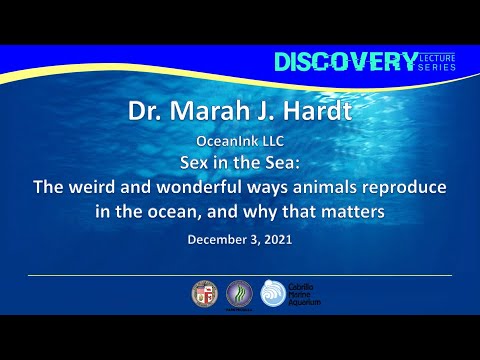Summary:
– The Discovery Lecture Series: Sex in the Sea explores the unique and fascinating ways marine animals reproduce in the ocean.
– Dr. Marah J. Hardt’s presentation highlights the importance of understanding these reproductive behaviors to conserve our oceans.
– Overfishing, climate change, and pollution have disrupted the natural mating rituals of marine species, impacting the abundance of sea life.
– The lecture dives into the elaborate mating rituals of armored lobsters, full-moon sex parties of groupers, and the sex-changing fish and kinky squid in the ocean.
– Understanding the intricacies of these behaviors can help us manage our oceans more sustainably.
Sex in the Sea: Our Intimate Connection with the Salty Erotic of the Deep
The ocean holds a vast and mysterious world filled with creatures that have evolved to survive and reproduce in its depths. From the bizarre mating rituals of armored lobsters to the full-moon sex parties of groupers, the Discovery Lecture Series: Sex in the Sea explores the weird and beautiful ways animals reproduce in the ocean. Presented by marine scientist and storyteller Dr. Marah J. Hardt, this captivating lecture combines colorful underwater photography, lively storytelling, and an urgent message about the importance of sustainable oceans.
For hundreds of millions of years, the ocean has been a stage for a salty symphony of intimate acts, ensuring the continuity of life beneath the waves. However, in the last century, human activities have begun to interrupt these intricate reproductive behaviors, leading to far-reaching consequences for both marine species and ourselves.
Dr. Hardt’s lecture takes us on a journey through the fascinating sex lives of ocean dwellers, showcasing the incredible adaptations and strategies they have developed to procreate. From the sex-changing fish that can switch their gender to kinky squid engaging in passionate embraces, the world beneath the surface is a cornucopia of erotic diversity.
One example is the armored lobster, known for its elaborate mating rituals. These lobsters engage in an intricate dance, with males battling for the affection of females. Their large, muscular claws make for an impressive display as they wave them in mesmerizing patterns. The victor earns the right to mate and pass on its genes, while the defeated males retreat to find other opportunities. It’s a spectacle of strength and courtship that has become synonymous with the lobster’s lifestyle.
Moving on from lobsters, Dr. Hardt delves into the peculiar mating habits of groupers. Large and solitary fish groupers are known for their full-moon sex parties. During specific lunar phases, these fish gather in one area to release their eggs and sperm simultaneously, creating a mesmerizing spectacle of life on a mass scale. Scale with the synchrony observed during these events is unmatched in the animal kingdom and showcases the incredible coordination achieved by these oceanic beings.
But it’s not just about the weird and wonderful. Dr. Hardt brings the lecture full circle, connecting the timeless topic of sex with the timely issue of sustainable oceans. Overfishing, climate change, and ocean pollution are all wreaking havoc on the delicate balance that nature has established beneath the waves. These disruptions threaten the natural reproduction patterns of marine species, leading to a decline in their populations and the overall health of our oceans.
As we learn about the intricacies of these reproductive behaviors, we realize the importance of understanding and preserving them. By appreciating the wonders of sex in the sea, we gain a deeper appreciation for the need to protect our oceans and the marine life they harbor.
Dr. Hardt’s presentation is a call to action, urging us to take responsibility for our impact on the ocean’s fragile ecosystems. Through sustainable fishing practices, reducing pollution, and addressing climate change, we can help restore and protect the bountiful life beneath the waves.
In conclusion, the Discovery Lecture Series: Sex in the Sea offers a captivating exploration of marine reproduction’s unique and fascinating aspects. Dr. Marah J. Hardt’s presentation shows the incredible diversity of mating behaviors in the ocean and ends the urgent need to protect and conserve our oceans. By understanding and appreciating the importance of these behaviors, we can work towards a future where the big blue sea remains a bountiful home for countless species for generations to come. So, dive into this intriguing lecture and discover the wonders of sex in the sea – an intimate connection that is, without a doubt, wet, wild, and truly important.
*****
Source Description
Sex in the sea is wet, wild, and also really imp. From the elaborate mating rituals of armored lobsters to full-moon sex parties of grouper, each strategy is finely tuned to suit the lifestyle and location of a species. For hundreds of millions of years, this salty symphony of sex has ensured the big blue sea stays bountiful year after year…until now. Believe it or not, over the last century, we’ve begun to interrupt these intimate acts of the deep, with far-reaching consequences not just for horny halibut but also for us.
Dr. Marah J. Hardt, a marine scientist and storyteller,r will present highlights from her popular science book Sex in the Sea: Our Intimate Connection with Sex-Changing Fish, Romantic Lobsters: Kinky Squid, and Othe Salty Erotic of the Deep. With colorful underwater photography and lively storytelling, Dr. Hardt will connect the timeless topic of sex with the timely issue of sustainable oceans. Overfishing, climate change, and ocean pollution disrupt the creative procreation that drives the wild abundance of sea life. Hardt will introduce us to the wondrous sex lives of ocean life and help us learn why understanding these behaviors matters for how we manage our oceans.


